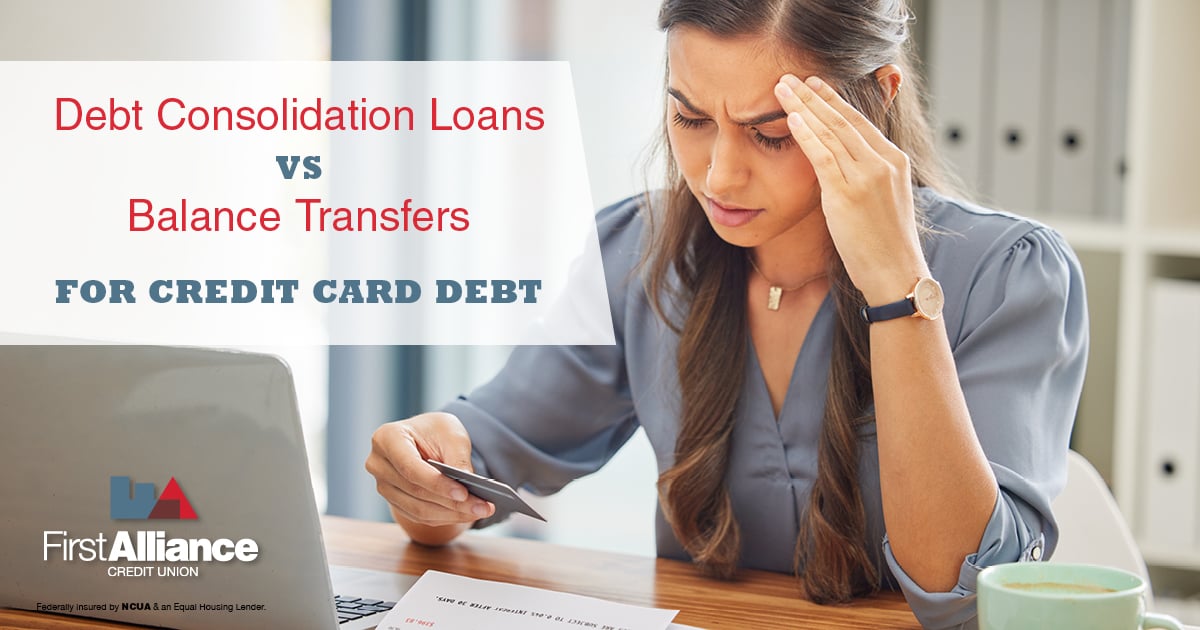What is Debt Consolidation?
Getting into debt is easy. Getting out of debt, though, is a lot harder, and the difficulty only increases if you have multiple debts. Between...
3 min read
 Jenna Taubel
:
Jan 18, 2018 6:13:00 AM
Jenna Taubel
:
Jan 18, 2018 6:13:00 AM

If you are struggling to pay all of your debt on time every month, then a debt consolidation loan might be a great option for you to gain some control over your finances. But what is debt consolidation and when is it most helpful? To find out, I sat down with an expert lender to get the full details about debt consolidation and when it’s most beneficial.
Meet Troy, one of the debt experts at First Alliance Credit Union in Rochester, MN!

Troy has helped hundreds of South East Minnesota residents in the last 12 years to manage their finances through debt consolidation loans. Troy’s favorite part of his job at First Alliance Credit Union is getting the opportunity to help people every day by giving them more control over their finances.
Troy’s Answer: A debt consolidation loan is used to pay off other outstanding debts, so instead of continuing to pay multiple payments each month, you only have one. The most common type of debt consolidation loan is an unsecured personal loan, but debt consolidation can also be accomplished through a home equity loan, or even transferring credit card balances from high rate cards to a lower rate credit card. Once you have consolidated your debts, even though the total amount you owe is still the same, your monthly payments are usually lower because the loan is now a fixed payment and your interest rates are lower.
Troy’s Answer: It really depends on what kind of debts they are, but overall your outstanding debts are paid off in full, so they will reflect on your credit report as such. For example, with a credit card if you close the card, it will reflect on your credit report that the debt has been paid and the card is closed. If you are going to keep the card open, then it will report with a $0 balance unless you begin to charge your card again. As for installment loans, like a car loans, it will report on your credit report that it has been paid and is closed. These changes will affect your credit score differently based on your overall credit report.
Troy’s Answer: Debt consolidation does have an effect on your credit score, but depending upon what your current debts are, it can either raise your credit score or lower your credit score. For example, a debt consolidation loan can raise your credit score by freeing up the availability of your revolving debt, such as credit cards. What I mean is by paying off your current debts on revolving credit and putting it into an installment loan, your credit availability will be at 100% right away. This can increase your credit score up to 100 points. On the other side of that, a debt consolidation loan can also have the opposite effect by lowering your credit score. This is because if you payoff and close all your debts your credit availability will stay low due to closing off your lines. The exact effects on your credit score is definitely something to speak to your lender about if you are considering debt consolidation, each person’s situation is different.
Troy’s Answer: Debt consolidation is best for someone who is paying high interest rates on multiple debts or is struggling to pay all their debts on time every month. There are definitely situations where debt consolidation isn’t needed. For example, we have seen where the interest rates that people currently have are better then what we can offer through debt consolidation, when we see this we help you structure your finances to pay off the debt quickly, usually through setting up a budget and a payoff plan. Overall, when you consolidate your debt you should end up with a lower monthly payment and with lower interest rates. If this is not possible then debt consolidation might not be the best option for your financial situation.
Troy definitely had some great insights for anyone considering a debt consolidation loan; here are the key takeaways from our conversation:
Still have questions about debt consolidation? Then check out our recent Facebook Live Q&A session with two debt experts, Troy and Kim. They answered questions in real time about debt consolidation.


Getting into debt is easy. Getting out of debt, though, is a lot harder, and the difficulty only increases if you have multiple debts. Between...

When you are struggling with large amounts of debts owed to multiple creditors, it’s understandable to want to ease the burdens and simplify your...

Whether you’re drowning in credit card debt or just looking to streamline your payments, there are countless options to choose from when it comes to...